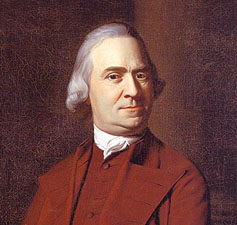- I. Chapter 1: "Sowing the Seeds of Revolution"
- In the summer of 1768 & 1769, a band of political rebels (56 of them to be exact) turned the world upside down by signing the famous document The Declaration of Independence. This opened up the country to a whle new "world" called freedom of speech and freedom of press. Writing and its power started getting recognition. People saw the positive and negative affects of it.
- Journalism and freedom of press become so pertinent, milestones such as "The Journal of Occurrences" and The Boston Massacre helped shape the history of journalism
http://www.thefreemanonline.org/wp-content/uploads/2010/07/declaration-of-independence.jpg. This image is of the Declaration of Independence. This here document helped in giving more freedom to America.
- II. Sam Adams
- Known as one of the best writers of his time...in 1773, Sam Adams would organize the Boston Tea Party.
- He was the brother of John Adams, another prominent figure in the Boston/journalism scene.
- He was a Harvard graduate and started small at the Boston Gazette.
- At the height of his career, he wrote "The Journal of Occurrences" which became to be one of the first types of newspaper. It included negative reports of the British soldiers. This motivated militiamen to come to Boston to look out for any bad activity. The accusations toward to the British troops later were known to be false.
http://www.nndb.com/people/732/000048588/sam-adams.jpg. This photograph is of Sam Adams, brother of John Adams. He played a vital role in starting the revolution of enformation.
- III. "Journal of Occurrences" as News Service
- Adams evolved the "Journal of Occurrences" into a communication network that spread its anti-British rhetoric to every street and alleyway of the colonies.
- This simple little phamplet became a phenomenom to everyone who encountered it.
- The "Journal" became habitual for the citizens; buying it and reading it whenever a new issue was released.
- Adam's main motivation for writing articles were the British troops stationed in Boston. They were put there to oversee the land and to make sure everything was under control.
- The articles were all in opposition for the British toops. Adam's would write about how cruel and harmful they were to law-abiding citizens; how they would rape women; etc... They were seen as villains.
- The "Journal" proclaimed to be "strictly fact", but ended up being "strictly false". With every case of a cruel British troop, came false statements in order to run them out of the city of Boston. It was a good idea and Adam's had great intentions, but he found out the hard way that lieing is not the answer.
- The "Journal" ceased operations when the truth came out after issuing 300 copies to the colonies.
- IV. Boston Massacre: Not to be Forgotten
- There were British troops in Boston during 1770 to maintain order and to enforce the Townshed Acts. Boston gangs would harrass them until no end. Finally, the troops were sick of the harrassment and fired into a crowd of rioters and killed 5 men.
- The impact of the incident was profound. Despite the best efforts of the government to cool down any anti-British acts, such as immediately removing the troops from Boston and postponing the trial by several months, the result was the increase of support for the independence of the people.
http://www.mahwah.k12.nj.us/web_disk/379-379/Revolution/350px-Boston_Massacre.jpg. This drawing depicts the scene that went on during the quick, yet brutal Boston Massacre. The Brits fired erradicly and killed innocent civilians without any significant reason. This caused mayhem for years to come.
- V. Common Sense Ignites a Nation
- Thomas Paine's Common Sense was somewhat responsible for America's successful separation from England. Using persuasive, effective writing strategies, the pamphlet made the case for American independence by attacking the King of England and arguing for self-government.
- I do, however, think it is absurd that people had the "balls" to argue the phamplet and to disagree with it. Yes, this was something no one had ever heard of or seen before, but at least give it a try! Mr. Paine saved our country. Without him, who knows what today in America would be like. But people wouldn't give him the light of day until others started to agree. Once everyone else does it, the others follow.
http://www.njreadforlife.org/PaineCommonSense.jpg. This is an image of the "Journal of Occurances". This document became a revolution. It was the first type of journalists entry where it challenged the way people thought and went about their daily lives.
- VI. Crisis Essay Inspire an Army
- The Crisis is a collection of articles written by Thomas Paine during the American Revolutionary War.
- General Washington found the first essay so inspiring, he ordered that it be read to the troops at Valley Forge.
- The essays are pro-war/pro-army and talk of his relationship with his gun, the battlefield, and war.
http://ecx.images-amazon.com/images/I/71PAZB2YY7L.gif. This is an image of Tom Paine's book of collected writings, such as Common Sense titled "Paine". This book incorporates all of his best writings. You can't get enough with this book.






No comments:
Post a Comment